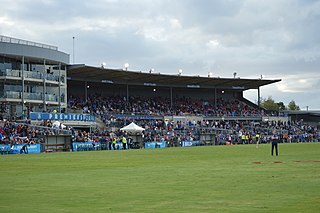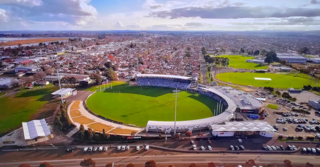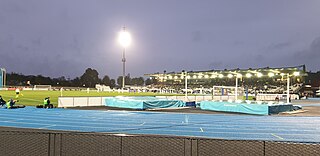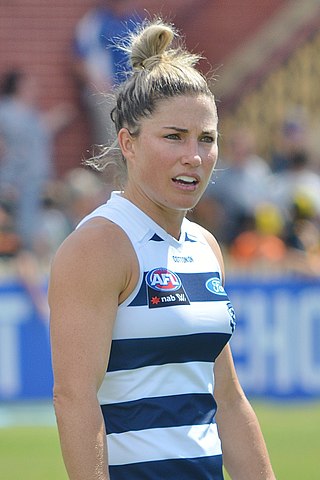Related Research Articles

The Western Bulldogs are a professional Australian rules football team that competes in the Australian Football League (AFL), the sport's premier competition.

Docklands Stadium, known by naming rights sponsorship as Marvel Stadium, is a multi-purpose sports and entertainment stadium in the suburb of Docklands in Melbourne, Victoria, Australia. Construction started in October 1997 and was completed in 2000 at a cost of A$460 million. The stadium features a retractable roof and the ground level seating can be converted from oval to rectangular configuration.

Yarra Park is part of the Melbourne Sports and Entertainment Precinct, the premier sporting precinct of Victoria, Australia. Located in Yarra Park is the Melbourne Cricket Ground (MCG) and numerous sporting fields and ovals, including the associated sporting complexes of Melbourne and Olympic Parks. The park and sporting facilities are located in the inner-suburb of East Melbourne. In the late 1850s, many of the earliest games of Australian rules football were played at Yarra Park, which was known at the time as the Richmond Paddock.

Whitten Oval is a stadium in the inner-western suburbs of Melbourne, Victoria, Australia, located in Barkly Street, West Footscray. It is the training and administrative headquarters of the Western Bulldogs, which competes in the Australian Football League (AFL). The ground is also the home of the club's women's and reserves teams which compete in the AFL Women's (AFLW), Victorian Football League (VFL), and VFL Women's (VFLW).

Representative matches in Australian rules football are matches between representative teams played under the Australian rules, most notably of the colonies and later Australian states and territories that have been held since 1879.
For most of the 20th century, the absence of a national club competition in Australia and international matches meant that intercolonial and later interstate matches were regarded with great importance.

Junction Oval is a historic sports ground in the suburb of St Kilda in Melbourne, Victoria, Australia.

The E. J. Whitten Legends Game was an annual charity all-star Australian rules football match played in Australia. Retired star players were reunited, along with selected non-footballing celebrities, in a State of Origin interstate game between Victoria and a composite side known as the All-Stars. The game was contested annually from 1996 to 2019 and played under Superules.

Australian rules football in Victoria is the most watched and second most participated code of football. Australian rules football originated in Melbourne in the late 1850s and grew quickly to dominate the sport, which it continues to. Victoria has more than double the number of players of any other state in Australia accounting for approximately 42% of all Australian players in 2023 and continues to grow strongly. Only Soccer in Victoria has more football participants, though the code's growth in Victoria has made up much ground lost to that code over previous decades such that they have now a similar number of players. The sport is governed by AFL Victoria based in Melbourne. The national governing body, the AFL Commission is also based in Melbourne.
Princes Park is an Australian rules football ground located inside the Princes Park precinct in the inner Melbourne suburb of Carlton North. Officially the Carlton Recreation Ground, it is a historic venue, having been Carlton Football Club's VFL/AFL home ground from 1897.
Kardinia Park is a major public park located in South Geelong, Victoria. A number of public and sporting facilities are located in the park: a major AFL stadium, a secondary football oval, a cricket field, an open air swimming pool, a number of netball courts, various sporting clubrooms, and a senior citizens centre. The park is bounded by Moorabool Street, the Geelong railway line, Kilgour Street, Latrobe Terrace, and Park Crescent.

Eureka Stadium, known commercially as Mars Stadium, is an oval-shaped sports stadium located in the Eureka Sports Precinct of Wendouree, 2.9 km (1.8 mi) north of the CBD of the city of Ballarat, Victoria, Australia.

Lakeside Stadium is an Australian sports arena in the South Melbourne suburb of Albert Park. Comprising an athletics track and soccer stadium, it currently serves as the home ground and administrative base for association football club South Melbourne FC, Athletics Victoria, Athletics Australia, Victorian Institute of Sport and Australian Little Athletics.

Susan Marie "Sue" Alberti is an Australian businesswoman, philanthropist and former Vice President of the Western Bulldogs Football Club.

Edward James Whitten Sr. OAM was an Australian rules footballer who played for the Footscray Football Club in the Victorian Football League (VFL).
The Fitzroy Bulldogs was a proposed Australian rules football club which was to have formed from the merger between the Fitzroy Lions and the Footscray Bulldogs, and was to have competed in the Victorian Football League from 1990. The merger was arranged in October 1989 to avert the imminent financial collapse of the Footscray Football Club, but was abandoned within three weeks of its announcement, after Footscray supporters raised almost two million dollars and secured sponsorship and funding to ensure their club's solvency and viability into the future.

Melissa Hickey is a former Australian rules footballer who played for the Melbourne Football Club and the Geelong Football Club in the AFL Women's (AFLW). She served as Geelong captain in the club's first two AFL Women's seasons. She also played in the Victorian Women's Football League/VFL Women's for eleven seasons, representing the St Albans Spurs, Darebin and Geelong. In the VWFL/VFLW, Hickey won seven premierships, represented Victoria on three occasions and featured in the VFL Women's team of the year.

Kirsty Maree Lamb is an Australian rules footballer playing for Port Adelaide in the AFL Women's (AFLW) competition. She has previously played for the Western Bulldogs Lamb previously played cricket for Victoria in the Women's National Cricket League (WNCL) and for the Melbourne Renegades in the Women's Big Bash League (WBBL).
Jordan Zanchetta is an Australian rules footballer who played for the Brisbane Lions and Essendon in the AFL Women's.
Relocation of professional sports teams occurs when a team owner moves a team, generally from one metropolitan area to another, but occasionally between municipalities in the same conurbation. Australia and New Zealand uses a North American-style league franchise system which means the teams are overwhelmingly privately owned and therefore favours relocation practices. Owners who move a team generally do so seeking better profits, facilities, fan support, or a combination of these.